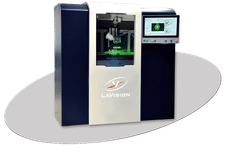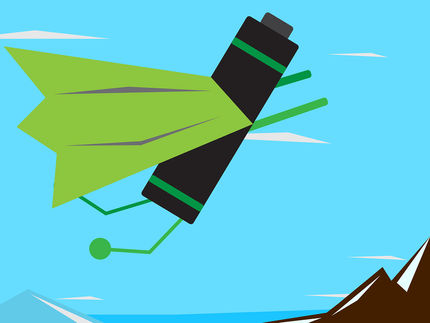University of Jena presents new types of batteries and other innovations for practical use
Innovative solutions for tricky problems
The increasing electrification of the chemical industry and the transport sector is increasing the global demand for sustainable and regionally available starting materials for electrochemical energy storage systems. Prof. Dr Martin Oschatz and his team at the Institute of Technical and Environmental Chemistry at Friedrich Schiller University Jena are therefore focusing on lignin as a starting material for battery electrodes. Lignin is a natural component of plant cell walls and is produced as a waste product in the paper industry, among other things. Through targeted chemical functionalisation, it can be used as a versatile and promising source of carbon materials. At this year's Hannover Messe, Prof. Oschatz and his team will be showcasing solid-state batteries that have a higher energy density, improved operational safety and even a longer service life thanks to the use of solid electrolytes. Visitors will also be able to see a composite material made from a porous carbon and a polymer with a high affinity for carbon dioxide, which can be used to bind carbon dioxide and reduce it electrocatalytically. This material could be used to capture carbon dioxide already emitted from the atmosphere.
Organic batteries with a wide range of applications
Organic batteries are another sustainable way of storing electrical energy. They are being developed at the Institute of Organic Chemistry and Macromolecular Chemistry at the University of Jena. The research team led by Prof. Dr Ulrich S. Schubert is cooperating with the Helmholtz Institute HIPOLE Jena. The key feature of this type of battery is the active materials made from organic compounds (polymers), which can replace potentially scarce inorganic electrode materials such as lithium cobalt oxide. The resulting increased environmental compatibility, simpler processing methods and mechanical flexibility open up a wide range of applications for organic batteries, for example as small, flexible batteries for smart clothing or packaging.
Innovative water sensors and Goethe in the rain
The cultural heritage of mankind is exposed to various threats worldwide. One way of making it accessible in new ways and preserving it at the same time is comprehensive digitalisation. Dr Andreas Christoph from the Thuringian University and State Library (ThULB) in Jena is also demonstrating these possibilities with his team at the Hannover Messe. "We are producing a true-to-scale copy of a bust of Goethe from 1820 in front of an audience using a 3D printer," says Andreas Christoph. The challenge is to select the right material because the replica is to be set up outside. The bust will be placed in front of the Goethe Laboratory at the University of Jena on Fürstengraben. Goethe will stand there in the rain from time to time - without being damaged.
A new type of digital sensor for measuring the "chemical oxygen demand" of a body of water is presented in Hanover by the team from the Thuringian Water Innovation Cluster (ThWIC). This value indicates the amount of oxidisable substances in the water and therefore the degree of pollution. According to ThWIC spokesperson Prof. Dr Michael Stelter, this is the first time that digital measurement of water quality is possible directly at the water, eliminating the need for laboratory tests. The innovative sensor is being developed in cooperation with several small and medium-sized companies. There will also be a preview of how the sensor can be used to determine the nitrate value in water, says Prof. Stelter. The second eye-catcher for trade fair visitors will be the so-called "technical kidney". This innovative idea uses 3D structures for water purification that are inspired by the human kidney. Combined with ceramic separation membranes, the energy required for water purification can be greatly reduced. The prototype is being developed jointly with the Ernst Abbe University of Applied Sciences in Jena.
Topics
Organizations
Other news from the department science
These products might interest you

SprayMaster inspex by LaVision
Quality Control for Your Spraying Process Through Digital Spray and Particle Analysis
Reliable, Automated, Digital - The Geometry Measurement of Your Spraying Process in Real Time

FireSting-PRO by PyroScience
New fiber optic measuring device: Precise measurements even in the smallest volumes
Measure pH, oxygen and temperature even under sterile conditions

VEGAPULS | VEGABAR | VEGASWING by VEGA Grieshaber
Cyber-safe level measurement - here's how it works
Find out more about the unique sensor for liquid and solid media

Get the chemical industry in your inbox
By submitting this form you agree that LUMITOS AG will send you the newsletter(s) selected above by email. Your data will not be passed on to third parties. Your data will be stored and processed in accordance with our data protection regulations. LUMITOS may contact you by email for the purpose of advertising or market and opinion surveys. You can revoke your consent at any time without giving reasons to LUMITOS AG, Ernst-Augustin-Str. 2, 12489 Berlin, Germany or by e-mail at revoke@lumitos.com with effect for the future. In addition, each email contains a link to unsubscribe from the corresponding newsletter.
Most read news
More news from our other portals
See the theme worlds for related content
Topic World Battery Technology
The topic world Battery Technology combines relevant knowledge in a unique way. Here you will find everything about suppliers and their products, webinars, white papers, catalogs and brochures.

Topic World Battery Technology
The topic world Battery Technology combines relevant knowledge in a unique way. Here you will find everything about suppliers and their products, webinars, white papers, catalogs and brochures.
Topic world Sensor technology
Sensor technology has revolutionized the chemical industry by providing accurate, timely and reliable data across a wide range of processes. From monitoring critical parameters in production lines to early detection of potential malfunctions or hazards, sensors are the silent sentinels that ensure quality, efficiency and safety.

Topic world Sensor technology
Sensor technology has revolutionized the chemical industry by providing accurate, timely and reliable data across a wide range of processes. From monitoring critical parameters in production lines to early detection of potential malfunctions or hazards, sensors are the silent sentinels that ensure quality, efficiency and safety.




























































